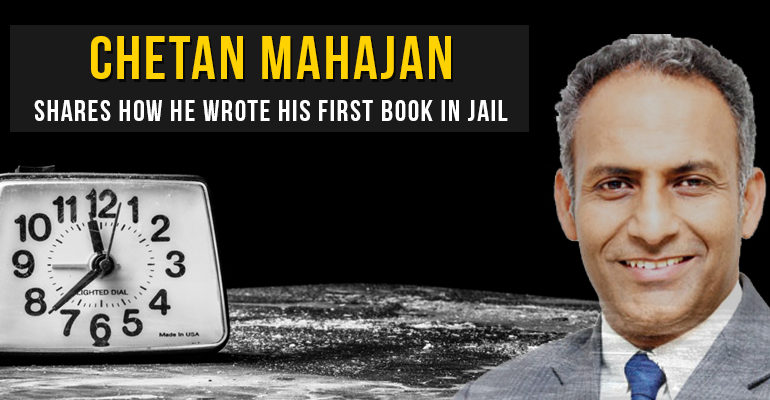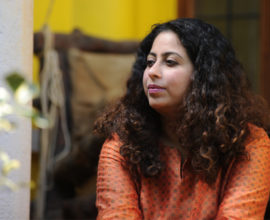Chetan Mahajan on How He Wrote His First Book in a Jail
This episode is unique because we are talking to one author who wrote the first draft of his book when he was in jail. Chetan Mahajan had a privileged education and an illustrious career spanning two decades in companies like O&M, Tata Interactive Services, Apollo group and Everonn.
Unfortunately, in his own words, he joined the wrong company at the wrong time and he soon found himself in jail. In this podcast, Chetan talks in detail what got him behind bars, how writing daily in jail kept him occupied? How he turned a daily journal into a book? And more importantly, how his book helped get back his reputation.
Chetan recently quit his role as HCL learning and moved with his family and dogs to a remote village in Uttarakhand, on the foothills of the Himalayas. Interestingly, the next book he is writing is about quitting the rat race and the hectic city life to live a more content, happy, and purpose-driven life. Let’s now listen to the conversation with Chetan Mahajan to hear his advice on how to write and publish your first book. Here is a great podcast for writers to begin their publishing journey.
Here’s the transcript:
[Music]
Kiruba: Hello and welcome to the first book podcast – India’s first podcast especially for those who have dreams and aspirations to become an author. My name is Kiruba Shankar and every week, I speak with experienced and bestselling authors to understand their writing habits, best practices, and tips to help you successfully author your first book. This podcast is supported by Notion PRess, India’s largest publishing platform. Their goal aligns perfectly with that of this podcast, which is to help you become a published author. They help authors with all supporting services like editing, proofreading, formatting, designing, printing, distribution, promotional services. This episode is unique because we are talking to one author who wrote the first draft of his book when he was in jail. Chetan Mahajan had a privileged education and an illustrious career spanning two decades in companies like ONM, Tata Interactive Services, Apollo group and Everon. Unfortunately, in his own words, he joined the wrong company at the wrong time and he soon found himself in jail. In this podcast, Chetan talks in detail what got him behind bars, how writing daily in jail kept him occupied? How he turned a daily journal into a book? And more importantly, how his book help get back his reputation. Chetan recently quit his role as HCL learning and moved with his family and dogs to a remote village in Uttarakhand, on the foothills of the Himalayas. Interestingly, the next book he is writing is about quitting the rat race and the hectic city life to live a more content, happy, and purpose-driven life. Let’s now listen to the conversation with Chetan Mahajan to hear his advice on how to write and publish your first book.
[Music]
Kiruba: Chetan, thank you so much for coming on this show. It’s such a pleasure.
Chetan: It’s my pleasure. Thank you for having me.
Kiruba: So, for listeners, Chetan is having a beautiful life in Uttaranchal, is that right, Chetan?
Chetan: That’s right.
Kiruba: It’s now a nice and cozy life but it wasn’t so sometime back because Chetan had to go through a very horrid experience and found himself in prison. So, Chetan, give us a quick review of what happened?
Chetan: Classic cases of being in the wrong place in the wrong time; probably working for the wrong employer. It was a large corporate background where there was some trouble that had been brewing and I just joined this company in October. I got to deal with the trouble on the ground in a place called Bokaro in Jharkhand and this was in December of 2012. Things blew up and our customers got very wild and filed a police complaint. And since I was the most senior representative of the company on the ground, the police arrested me. I was put in jail; it was not clear how long it would take for me to come out. Now, you know, it was a month. That was kind of the genesis for how…that’s the situation in which the book was actually born.
Kiruba: Got it. One month was something that you didn’t anticipate but I loved the fact that you used the one month proactively and it really triggered the author in you and you started to write your daily experiences of your days in jail. So, my question is did you start off with the book in mind or did you just want to write a daily blog or experience and later you converted all that experiences into a book?
Chetan: This entire incident and my going to jail was completely unplanned. So, obviously I didn’t start with a book in mind. It was more, you know, I have been a closet writer for a while; I started a couple of books, I think like a lot of people I know, you had some idea, you start writing it down, then you kind of couldn’t keep up with it for lack of motivation, or other things taking over in life. But then, when you land up in jail, a lot of things happen. First is, you are surrounded by very interesting subject material. Second is that you have a lot of time in the world because you have nothing else you do; all connectivity and distractions are taken away. And it was lucky for me that within the first two three days I figured out that I would stay safe and nobody would touch me. The moment that was done, it really came down to almost boredom. Okay, now I am here and not sure how long I’m here, so, what do I do with myself? And that’s when the closet writer came back up and said, you know let’s just write everything down. So, where that book will go? Will it get published? Will it be just a diary for my own reference sometime later in life wasn’t very clear. I was also very keen that since this horrible thing had happened to me, I wanted to make the most of it and make something positive about it. And writing a book would really turn the whole thing around on its head and that’s how it started and that’s why I started writing down because that was one of the few things you could do. You could read, you could write, and that’s it.
Kiruba: What was your daily schedule like? We can talk about your writing while you were in the jail.
Chetan: So, it wasn’t very structured. I mean I am a morning person and I usually like to get up in the morning and do stuff but daily everything happens as per sun up and sun down. Whether it’s winter or summer, there are 20 25 men in a ward and all men are locked up at sun down and unlocked at sun up. That’s how it was. There were very, very frequent power outages, so you could not write or read always to your own schedule. But my writing was usually filler. There would be breakfast, I maintained a habit of running in prison because that was one of the things you could do. I would typically make it a point that I would write every day and as you can imagine in a scenario like that, you are not always in a great state of mind. There are days which are terrible and you are really feeling depressed.
Kiruba: Hmmm.
Chetan: Even on those days, I made it a point to write at least 3 or 4 pages. And on a good day, I would write 10 15 pages. Pages, I mean, this is long hand written in register because there’s no computers inside.
Kiruba: And of course, they would supply you with a book and a pen, all that right?
Chetan: Well, they didn’t supply with anything. If you asked your friend, relative, father, brother, or whoever was visiting would bring it for you. But it was not on the objectionable list. They were okay with paper and pen.
Kiruba: Got it. How many pages did you really complete? So, obviously you didn’t have the book in mind. But I loved the fact that you turned what was a very, a very negative scenario for you in an employment perspective because, hey, let’s face the fact that no company would really want to employ someone who has been to jail, right? I mean that’s the reality. But I love the fact that how you smartly turned this negative around and the book, like you said, really turned it on its head. And what was a completely negative thing, or perceived as very negative, the book gave you an opportunity to explain your scenario and make it very interesting. How did the book help you in resurrecting your career or the perception?
Chetan: After I came out of jail, I told my employer then that look, there’s no way I’m going to quit because the case is still on and it has me named in it. But at the same time, I will not work for you. The only thing I will for is to sort out the case because I had no motivation left to work at that company. I came out in the end of January and by early March, the case had been quashed.
Kiruba: Which year is this?
Chetan: This is 2013, January when I came out. So, that was done and it was very clear and sorted out that my name was in the clear and I had already been in conversation with HCL. They told me very clearly that they were very interested in hiring me but it would only work if they could not hire under trial-and-error basis. So, once the case was squashed, you know, when I met with people, it was quite strange because they would look at you because some would have known that you had gone to jail and others would not. Even today, when you say I went to jail for a month, now, I talk about it very matter of factly. But Initially, it was very strange for me and you could tell that the moment you said something like that, they looked at you very weird. There is an assumption that he must have done something and you don’t just go to jail for a month just like that. And I think at some point of time, it was also a decision for me saying, “Am I going to be defensive about this for the rest of my life?” Because, then you know every time it comes up, you have to kind of sound a little apologetic and explain how it happened and what happened to people or you just add things happened. But I just decided that I was going to make one American friend said, “It’s like making lemonade out of lemons.” I didn’t have this decision of publishing it because then it really becomes then other person’s problem to deal with the fact. That’s not my problem because I have explained everything with as much detail and it’s been published by respectable publisher. There is nothing much left to really go back and kind of…so there is no defensiveness required on my part beyond this, at least.
Kiruba: Beautiful. I am sure you would have dreams of papers of your daily writing from the jail. What process did you undergo to convert those sheets of paper into a manuscript that eventually turned into a book?
Chetan: So, I had two registers which were full. This was all long hand and I realized, I think that actual writing of the book happens after the first draft. So, what I got out of the jail was the first draft. That was the easy part and then I converted that to a manuscript. I went to Penguin and a couple of authors and they said, “It was interesting but there’s no narrative, there’s no flow. So, you really have to work on it.” Then I understood that part and I worked on it quite a bit. So, I was looking for help as you said earlier like you know how do you find guidance, how do you even learn how to write. So, I picked up a couple of books and one that I would specifically mention was called Writing Well. It’s by a guy called William Zinsser. And in many forms, he was my guru. He really helped me get a decent manuscript out and he specializes in nonfiction. So, his whole book is about how do you write a good non-fiction. That was really kind of the starting point and then it went into first draft, second draft, and third draft and Chiki Sarkar was the publisher from Penguin was pretty brutal, where she just told me that this section had to go; because they don’t fit in with the book. So, I had kind of wandered off here and there and I talked about religion in it, and about many other. But she said, “No, you are telling the story of a jail. So, your views on religion are little irrelevant to the reader.” Sticking with the knitting and making sure that it’s a story and every single story moves the story forward, you know, those kinds of things and I don’t think you ever master it. But it’s a perpetual on-going kind of battle. That process was involved many, many redraft, rewriting, and you can tell the fact that I was released in the January of 2014 but the book was only published in the February of 2014. After I came out, it took me months to get my head straight back on because you know, it was a tough experience. After that, it took at least 6 to 8 months of just rewriting, editing, fine-tuning, re-editing and all of that before it was in publishable form.
Kiruba: For many first time authors, this is something that they don’t anticipate. Many people anticipate the time taken to write and they think that once they finish writing, then the next thing is quickly just get it published. Unfortunately, that’s not the case, right? In your case it took about a year. So, what would be your advice for first time writers?
Chetan: First is read up on books; writing has been around for a long time and the best way to become a good writer is to read stuff which you think is awesome. When you have something to follow, and also read these style-guides, you might kind of sneeze at them and a lot of people say that writing cannot be taught but it is a craft. And just like many things, you have to learn a lot of things about writing and writing well. Second is, in terms of the skills that are involved and in terms of the work it takes, people, you yourself, and all the people around you are inherently biased. So, if you show it to your wife, or five of your friends, it will be very hard for them to come back and say, “Look, this is crap.” You really have to find somebody who is like an independent, an authoritative person in the field and ideally it should be somebody who vibes well with the book. If it’s a book about bureaucracy, show it to someone who understands that space. If it’s a fast paced nonfiction book like mine and you are clearly targeting at people who are your own profile, try and send it to those people. Of course at the end of the day, your publisher or your, you know, whoever you send the book to at the publisher’s end is going to be the final kind of judge. But it’s good to get some independent perspective and get some feedback from people who you know will be honest and who have a good understanding of the language and who typically have the habit of reading because they are the people who will be able to give you good feedback and good comments on what you should be doing and how you should be modifying it. Many a times, it actually requires multiple starts. I am working on my next book now.
Kiruba: Go ahead; give us a sneak-peak of your next book.
Chetan: The book I am working on now is about the decision of leaving the city and moving to the mountains. The working title is the Rat Who Wouldn’t Race.
Kiruba: [laugs] I love that title. Can I pre-order it right away?
Chetan: [Laughs] I don’t even have the publishers lined up yet. But the point I’m trying to make is I’ve started that, I’ve written 20000 words, which is half the book. Then I’ve relooked at it and shown it to a few people. I have read a few other books and I am completely dissatisfied with it. And one of the decisions I had to make was, “Should I try and edit it and fine tune it or should I try and start from the scratch?” And after having written half the book, I am actually rewriting from the scratch and I am down to two and a half thousand words right now.
Kiruba: Wow.
Chetan: So, I think the important thing is that it’s not a job to get done. It’s something that has to please you and you have to be happy and satisfied with it. Only if you are thrilled that you’ve done your best, should you actually take it out to a publisher. I know it’s a lot of hard work; it’s solitary, very boring and very challenging. You have to be okay with all of those boxes and then go forward and give it a shot. But it is not easy. It’s not like you will get it right the first time. You talk to anybody like Jeffrey Archer. He rewrites and edits his book six to seven times before he sends it to a publisher. So, it is hard work and it is arduous and you have to stick with it.
Kiruba: Brilliant. Talk to us about your journey of finding a publisher. How did you approach them and what was the homework you had to do before you approached them? Talk us through that process.
Chetan: In my case, it was actually deceptively simple. I come from the education industry; I landed up in prison also because of working for a company which was actually, once upon a time, a darling of the stock market educational company. So, I had a connection with Penguin and I reached out to those people and I was able to send the manuscript across. They were notoriously slow in coming back to you in that the first draft came back almost after a month and a half and that’s when they told me that there’s no narrative, there’s no flow. It could be very interesting. So, the thing is that in my case, it was fortunate. But the story was very interesting. By the time I was writing the book, I was the CEO of a company, the HCL group. So, the CEO went to jail and wrote a book comes together very well. It was a very marketable story from a publisher’s perspective and I don’t think there were very convinced of my skills as a writer. I actually did not go to another publisher. I just went to these guys, they expressed some degree of interest and they asked me to work at it. I did work much, much harder and took a lot of stuff out and straightened it and rewrote it a few times.
Kiruba: The owners of marketing the book typically people think the publisher will do it. But time and time again, I have heard that is wrong and it’s really the author who should take the highest responsibility for pushing it. Was this the case with you? And how did you go about it?
Chetan: I think it is pretty much the case all across. The best way to think about a publisher is somebody who is very good at printing, putting stuff together, and also a very good distribution arm. Depending on who your publisher is, if it’s Penguin, you’ll get it to all the upmarket stores; you’ll get it to Crosswords and everything else. If it’s Rupa, you can also land up at the train stations and you know, their distribution is different and also very strong in its own way. But they’re a distribution company. What they will ensure is that your book is visible on a shelf for one or two months after its launch. Beyond that, a lot of marketing depends on the author and the fact is that the given the amount of money you make from the book, you get very, very little as royalty. The marketing almost never makes the book breakeven from a purely economical perspective. You would have to invest a lot of money and time, push a lot and probably spend Rs 20 or Rs 30, when the book will actually pay you back maybe Rs 8 or 10. But there is another thing to be said and that’s simple thing is that unlike saying that Penguin releases 200 books and therefore it has this marketing and sales engine, if actually that every single book is a unique and new product. When a person buys a book, they don’t really see whether it’s form Penguin or from Rupa. They see what the book is about and that’s how they decide about it.
Kiruba: Right.
Chetan: So, the best thing you can do to market your book is write a fabulous book. I mean it is as simple as that, you know you have to have a fabulous product. If it’s a fabulous product, books really sell on word of mouth because people really talk about something that they have read which they have really enjoyed and they will slam something that they thought was really bad and every individual will have one opinion. There’s always this narcissism, there will always be a belch of sorts. But there’s always that large majority somewhere in the middle which will either like it or not like it. And based on that, the book will take off or not take off and you as an author trying to push it, a money losing strategy. So, if you are writing a book, make sure that you write the best book you possibly can. I don’t think you can do better than that to market your book. After that, yeah, you can continue to do stuff, so, I did some Facebook things and I spent some money there. I knew what anybody in this digital age would do. Because of the story, my book also attracted a huge amount of press and media attention. I was on radio, both Delhi and Mumbai for one hour each and stuff like that. But at the end of the day, it really comes down to how good is the product. And if your book doesn’t read very well, and you can do all the marketing in the world, that will inspire 5 7 people to buy it. But unless those 5 or 7 people go out and start saying really good things about it, it will stop.
Kiruba: Correct, correct! On that note, Chetan, on behalf of all the listeners and first time authors, really want to thank you for all the brilliant pieces of advice that was so elusively elucidated. I think it is fantastic. Thank you so much.
Chetan: You’re welcome and it’s my pleasure. Thanks!
[Music]
You were listening to the first book podcast, which is India’s first podcast specially aimed at first time authors. Do tune in every week to notionpress.com/podcast to follow new conversation with bestselling authors to hear their tips, tricks, and techniques to become a published author. On that note, a word of appreciation to Notion Press for supporting this show. I would love to hear your feedback and encourage you to write to me at kiruba@kiruba.com. Until next week, take care and bye!





